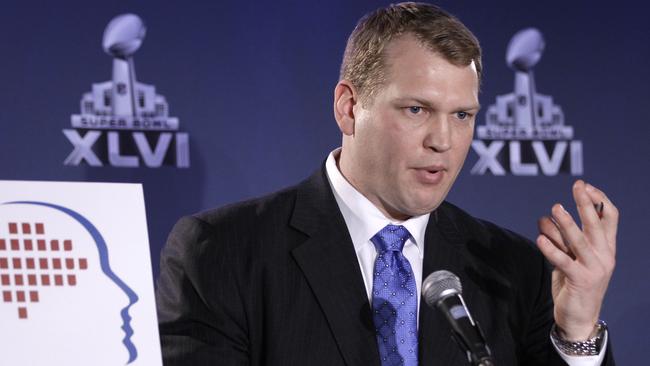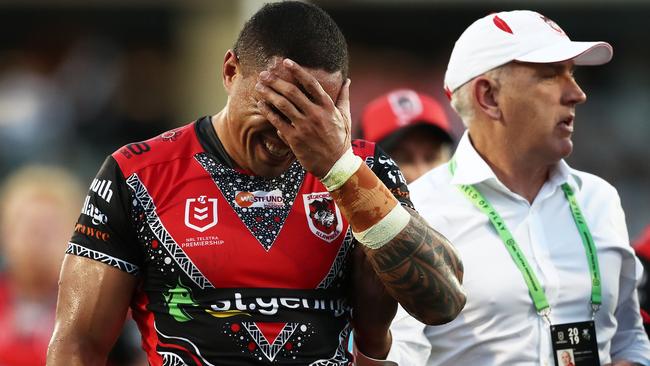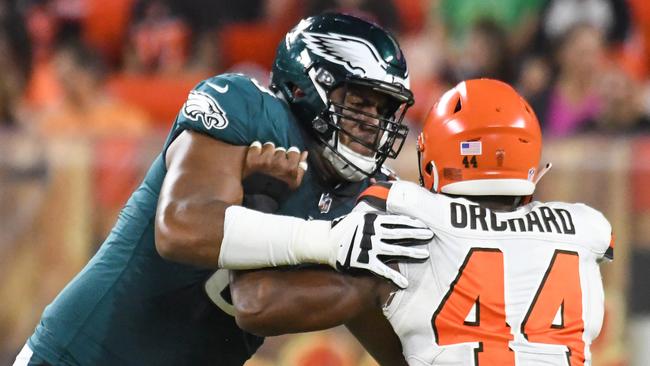Concussion expert says NRL should ban full-contact drills
Following the game-shaking findings that two former NRL players had been diagnosed with concussion-related brain disease, one world renowned expert says the NRL should follow the NFL and end full-contact drills.
One of the world’s pre-eminent concussion experts claims it’s only a matter of time before the NRL follows the NFL and limits players from full-contact drills during the regular season in a fight to kerb the risk of concussion and brain trauma.
Chris Nowinski, Concussion Legacy Foundation chief executive and co-founder of the Australian Sports Brain Bank, also says the NRL needs to lead a cultural change of junior league coaches and players and high school footballers so that collisions are restricted — and in some cases banned — during the season, as it is in the US.

Nowinski spoke to The Sunday Telegraph in the wake of groundbreaking findings this week that, for the first time, revealed two former NRL players had been diagnosed with CTE — the brain disease linked with repetitive head trauma.
The findings have been described by medical professionals as a wake-up call for Australian sport and has led to a string of past and present first grade players to declare they’re willing to be part of any research which results in limiting the risk of CTE.
In America, Nowinski has been a vocal supporter of the NFL’s decision to reduce the risk of head-on collisions.
The NFL have made the changes after more than $US500 million in claims have been approved under the NFL’s concussion settlement — which resolved thousands of lawsuits that accused the NFL of hiding what it knew about the risks of repeated concussions.
LISTEN! In a special one-on-one interview Matty sits down with Sam Burgess to talk through the highs and lows of his career, his desire to play at Manly and his venture into rugby union.
Nowinski, a former college footballer and WWE wrestler, has applauded the NFL’s extraordinary stance over the past four years to limit all heavy contact to just 14 days over the course of an 18-week season.
The NFL also allows one practice per day for full-contact on each day of pre-season.
At college football level, the NCAA does not mandate limits for its college football teams, offering only recommendations.
The various conferences set their own limits, ranging from the Pacific-12, which allows 90 minutes a week, to the Ivy League, which does not allow any full-contact training.
At the high school football level, some schools have restricted full-contact drills in practice to 15 minutes a week and just six hours in total across an entire pre-season.
Full contact, according to the NFL, is considered tackling that brings a player to the ground.
Without wanting to frighten any future NRL players from chasing their rugby league dream, Nowinski said there were two categories of which to try and reduce the risk of CTE.

“What we know today is that the sole known risk factor for developing CTE is exposure to concussions and repetitive head impacts, so we should try to prevent repetitive head impacts and concussion as best we can,’’ Nowinski said from the US.
“It also means we consider how children are introduced into the game and when they’re introduced to repetitive head impacts.
“That means we completely change how we practice these sports. I would say that’s inevitable that the sports, like NRL, will change.
“It’s just a question of how fast we can get there.’’

Nowinski conceded that while the NFL — with its players wearing helmets and pads — was a different sport to the NRL, the recent findings in relation to CTE and rugby league should be enough to spark concern within the code.
“In the regular NFL season there’s 18 weeks and you’re only allowed 14 days of contact during those 18 weeks,’’ Nowinski said.
“Two states of our 50 states just had their high school athletic associations make it a maximum of 15 minutes of live hitting per week, during the week.
“People are starting to get very smart about this.
“We need to retrain the coaches on how to teach the sport without hitting the athletes in the head.
“There’s no question that’s possible, we just need to ask them to do it and gain their buy-in and making that a goal.
“It also means educating the players and being honest with them.
“In my mind, there’s nothing wrong with adults choosing to play a professional sport that is dangerous, so long as they understand the risks.
“But if we’re telling the players this isn’t real, that’s an ethical problem.’’
The Sunday Telegraph spoke to the NRL, who wouldn’t be drawn on if they would consider placing parameters around full-contact.
“The NRL has significantly increased its focus and investment in this area of player safety and will continue as an active participant in the work of the global sport community to advance the understanding and management of head injuries in contact sport,’’ an NRL spokesperson said.
Nowisnki has also assisted in the set-up of the Australian Sports Brain Bank based out of Sydney University.
In the wake of last week’s findings, Parramatta legend Peter Sterling has declared he will donate his brain to the bank in the hope that he can contribute to the research program.
“CTE has been a neglected disease and still is,’’ said Nowinski, Concussion Legacy Foundation chief executive and co-founder of the Australian Sports Brain Bank.
“One of the reasons we wanted to start the Australian sports brain bank is we recognise that every year counts.
“We encourage athletes to pledge their brain to the Australian sports brain bank.
“The science in America doesn’t seem to mean as much as science conducted in Australia and that’s why we’ve worked to facilitate the science in Australia, by Australians, on Australians, to hopefully change hearts and minds faster so that we can save lives.’’


